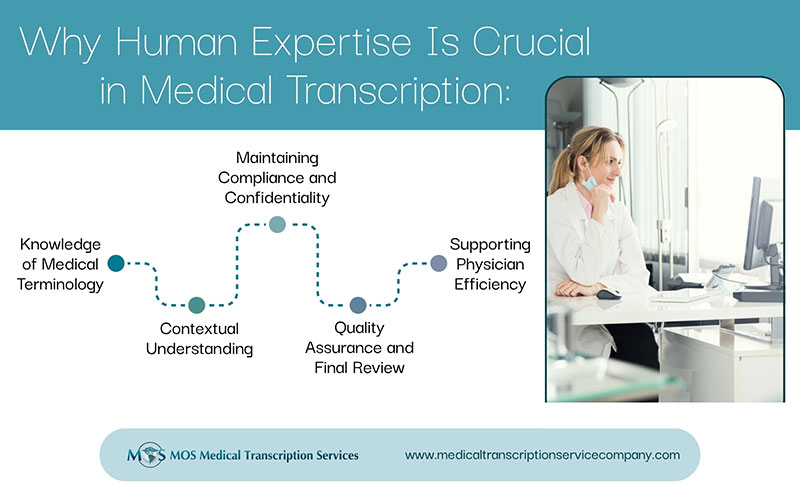 A good patient-doctor relationship is an essential element for winning the trust of the patients and getting him/her to share all their concerns with the provider. This is important from the point of view of providing better patient care and achieving better outcomes. Communication is thus an important aspect when it comes to providing medical services. Clear communication is also a very significant requirement to ensure accurate medical documentation and appropriate patient care, as any provider of medical transcription services would agree.
A good patient-doctor relationship is an essential element for winning the trust of the patients and getting him/her to share all their concerns with the provider. This is important from the point of view of providing better patient care and achieving better outcomes. Communication is thus an important aspect when it comes to providing medical services. Clear communication is also a very significant requirement to ensure accurate medical documentation and appropriate patient care, as any provider of medical transcription services would agree.
During their training period, physicians do learn how to interview and get information from patients during their consultation, evaluate the patients and their condition, diagnose and treat their diseases. However, other important aspects of patient care such as relation building and dealing with the patient’s emotions are not often given the due focus. It is important to build a strong rapport between the patient and doctor as it helps patients to share their concerns with the doctor. In the healthcare industry, transparent communication between doctors and patients is essential for quality care and good health outcomes. Treating a patient with respect helps them to communicate well and engage with them even outside the hospital settings. A doctor should be a good listener too. When the doctor’s ability to listen to patients is limited, they may miss crucial health signs and misdiagnose illnesses. Therefore it is important to engage constructively with patients, exchange information and build a positive relationship.
According to Walter Baile, MD, director of the Interpersonal Communication and Relationship Enhancement program at the MD Anderson Cancer Centre in Houston, there are some simple things a doctor can do to allow patients to feel they have your attention and the most important things are:
- Maintain good eye contact with the patient
- Secondly, do not interrupt when a patient is talking. A doctor should be a good listener.
Building a Good Relationship
It is important to treat patients well and give them the impression that they are really cared for. At every stage physicians should explain about the treatment, medications, tests etc and keep the patient informed about the possible consequences. Sometimes physicians find it difficult to build a good rapport with patients during short visits but it does not take too long to obtain information about the patients. They can begin the conversation by asking questions like “tell me about yourself, who all are there in your family,” etc. This kind of informal communication will put the patient at ease, and gradually persuade him/her to take the doctor into full confidence.
Employ “NURS”
 Jane Schell, MD, a palliative care nephrologist and clinician educator at the University of Pittsburgh Medical Centre, said that physicians can sometimes go wrong by feeding a lot of information to the patients in order to make them understand the care they are receiving. This can create medical jargon and confuse the patients. Dr Schell suggests that the “ask-tell-ask” approach is a good method of communication that helps to know about the patient. It helps to improve communication by encouraging physicians not to lead patient encounters with their agenda and it also eliminates the chances of interrupting the conversation. Physicians should expect that the patients may react emotionally to the medical information given to them. Using NURS tactics i.e. Name, Understand, Respect and Support is the best way to communicate with the patients. Dr Baile recommends that physicians should ask patients about their worries and try to pacify them.
Jane Schell, MD, a palliative care nephrologist and clinician educator at the University of Pittsburgh Medical Centre, said that physicians can sometimes go wrong by feeding a lot of information to the patients in order to make them understand the care they are receiving. This can create medical jargon and confuse the patients. Dr Schell suggests that the “ask-tell-ask” approach is a good method of communication that helps to know about the patient. It helps to improve communication by encouraging physicians not to lead patient encounters with their agenda and it also eliminates the chances of interrupting the conversation. Physicians should expect that the patients may react emotionally to the medical information given to them. Using NURS tactics i.e. Name, Understand, Respect and Support is the best way to communicate with the patients. Dr Baile recommends that physicians should ask patients about their worries and try to pacify them.
Keep Note of Verbal and Non-verbal Communications
With the introduction of EHR, doctors are forced to spend most of their time documenting medical details and less time with patients. Utilizing EHR-integrated medical transcription services would help physicians spend more time with the patients and establish a strong patient-doctor relationship. Patient experience must be a major area of focus for any practice, and priority must be given to make their visit enjoyable. The physicians and other clinical staff must be empathetic and share the patients’ concerns. They should strive to address any concerns that may be causing anxiety to the patient. Importantly, physicians should be aware of their body language, and verbal and non-verbal communication when interacting with patients. They should be patient, provide all the necessary instructions carefully and show real concern.


